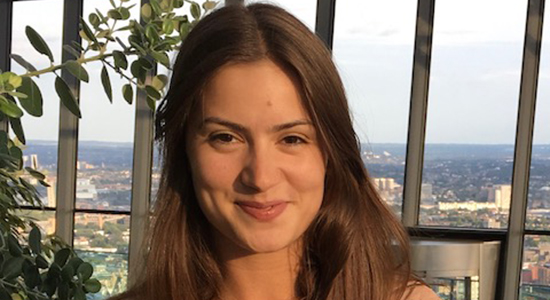Leah Moss

Leah Moss is a graduate of the MSc in Global Development at the University of Copenhagen. In this brief interview, she shares her academic experience, professional exploration, and her dedication to feminist approaches in development.
Please tell us a bit about yourself (where you're from, your academic background, etc).
I grew up in Manchester in the UK, and pretty much always thought I wanted a career in foreign policy. For my bachelor degree, I studied international history at the London School of Economics and Political Science (LSE) which I chose because it was more modern and less traditional than the average history degree. I took courses on decolonisation, US foreign policy in the Middle East and Latin America, as well as economic history and international relations. It was great to study at a university with such a rich political history and the course provided a really critical perspective on foreign policy and international development.
Why did you choose to study Global Development at UCPH and how has your experience been as a graduate?
I became more interested in international development during my bachelor, and started thinking more about the role of civil society and multilateral institutions like the UN in development, peace and security. The course at KU appealed to me because it was interdisciplinary and research-focused, plus it gave me the chance to study abroad in a beautiful city! In the UK, most masters are only one year, and I liked the idea of a two year course to go deeper into studying before starting work. I really don’t regret it, I was able to do a 6 month internship at a foreign policy think tank in DC, and spent time researching women-led peace activism in Israel and Palestine for my master thesis. By the end of the masters I felt really sure of what field of work I wanted to go into.
What do you highlight the most from this experience?
My number one highlight from the experience was the people on my course! As a relatively small cohort of students, with a huge amount of contact time and group work, we got to know each other really fast and formed a strong bond. Studying with people from very different backgrounds and all corners of the world really broadened my horizons and introduced me to totally different perspectives. We spent a lot of time debating and having really challenging political conversations, and I think this is honestly how I learnt the most. Plus it built some of my closest friendships to this day!
What was your employment situation after finishing the degree?
I applied to so many jobs while I was finishing my thesis! I knew I wanted to work for an NGO and gain experience in what international development programmes look like in practice. I moved back to London to work at a small NGO focused on HIV prevention and sexual and reproductive health in countries in Southern Africa. It was an entry level job – so a lot of admin - but I was able to lead the development of a new SRHR programme for adolescent girls in Malawi. Since then, I have worked on policy, advocacy and campaigns around gender equality, SRHR and education at large INGOs (Plan International, Oxfam). I am now a policy strategist at an international women’s fund, Mama Cash, based in Amsterdam, which provides direct funding to feminist movements and organisations all over the world. I work with governments and foundations to help them reconsider traditional approaches to aid and philanthropy by driving resources to the local civil society organisations and feminist activists who are confronting the biggest social and political challenges of our time.
What advice would you give to current GD students and recent graduates?
Stay curious about what really matters to you. Throughout my studies I was always drawn to feminist thinking and approaches – how gendered power dynamics show up in foreign policy, peace and conflict and development. Even if I was critical of the international development sector, I still wanted to be a part of seeking to transform it in some way. I am now working for an organisation that is really aligned with my values – but it’s been a journey to get here. You don’t need the perfect job right away, just consider it a long process of figuring it out and learning a little more each time about what is really important to you.
